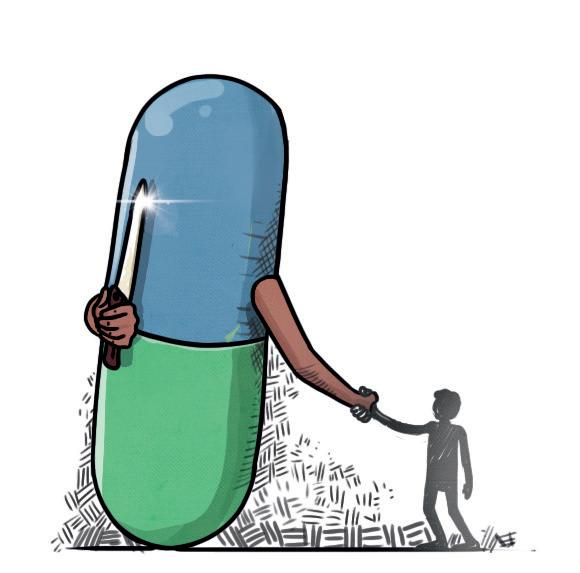Essayer OR - Gratuit
Devastating societies through war and drugs
Down To Earth
|November 01, 2023
Generics giant Teva is top among drug firms found guilty of fuelling the US opioid crisis, agrees to pay $4.25 billion

ISRAEL'S SCORCHED earth policy in Gaza has left the world scouring for terms that capture the horror at the barbarism they are witnessing. Humanitarian organisations such as Médecins Sans Frontières (MSF) and the International Committee of the Red Cross (ICRC) appear to have struggled with their statements of condemnation as the relentless bombing of the small strip of land, which is home to 2.2 million Palestinians, left searing images of the dead and dying in a devastated landscape. Even academics were hard put to describe the holocaust unleashed by the Israeli government; some settled for genocide, as did the Colombian President.
An MSF official described as outrageous Israel's 24-hour notice to over one million people in Northern Gaza to leave their land, homes and hospitals. "Unprecedented" does not even cover the medical humanitarian impact of this order, the official said. ICRC described the situation in Gaza as "abhorrent" as residents scrambled for water and food while health facilities and medical personnel were targeted in the bombing of the world's most densely populated area.
A statement issued by Gaza's authorities after the Tel Aviv regime began a complete siege of Gaza in response to the Hamas attack described the action as "the dirtiest crime of collective punishment against defenceless civilians in modern history". Since half the population of Gaza are children, it did capture the true horror of the bombing. Al Jazeera news agency quoted an Israeli official saying it had dropped 6,000 bombs weighing 4,000 tonnes on Gaza in the first six days of its war, killing vast numbers of children.
The vocabulary of outrage indignation is patently limited for a catastrophe on this scale. Responses also depend on a nation's and an individual's moral compass and political ideology. Sensitivities can be sharpened by a familiarity with a situation.
Cette histoire est tirée de l'édition November 01, 2023 de Down To Earth.
Abonnez-vous à Magzter GOLD pour accéder à des milliers d'histoires premium sélectionnées et à plus de 9 000 magazines et journaux.
Déjà abonné ? Se connecter
PLUS D'HISTOIRES DE Down To Earth

Down To Earth
THINK TWICE BEFORE FELLING SAL TREES
Many trees considered to be affected by sal borer in the 1990s are still alive today
1 mins
February 16, 2026

Down To Earth
EDGE OF SURVIVAL
Caste divides deny marginalised communities land, resources and essential aid, leaving them more vulnerable to climate disasters
6 mins
February 16, 2026

Down To Earth
A WISH LIST?
Union Budget for 2026-27 conveys the impression of a roll-call of intentions and ambitious proposals, with little detail on their formulation
6 mins
February 16, 2026
Down To Earth
Break down the gender wall
THE RULING National Democratic Alliance (NDA) government has been heavily invested in the goal to make India a developed economy by 2047.
2 mins
February 16, 2026

Down To Earth
MENSTRUAL HEALTH, NOW A FUNDAMENTAL RIGHT
In a landmark judgement, the Supreme Court has recognised menstrual health and hygiene as a fundamental right under Article 21 of the Constitution of India, which guarantees the right to life and dignity.
8 mins
February 16, 2026

Down To Earth
Of devolution and new disasters
The 16th Finance Commission pushes for changes in view of new fiscal and climatic conditions
11 mins
February 16, 2026
Down To Earth
Rising risks of plastics
NEGATIVE IMPACTS on human health due to emissions linked to the plastic lifecycle could double by 2040, according to a study published in The Lancet Planetary Health in January.
1 min
February 16, 2026

Down To Earth
GAP BETWEEN EPIDEMICS NARROWING
A watershed-based and landscape-level approach is needed to address forest degradation
2 mins
February 16, 2026

Down To Earth
WAITING TO STRIKE
Sal heartwood borer is considered the biggest threat to forestry in India, especially to the sal tree, where it lives and breeds.
11 mins
February 16, 2026

Down To Earth
A SPRING DELIGHT
Mustard flowers are not meant only for the eyes. Invite them to your plate once in a while
3 mins
February 16, 2026
Translate
Change font size

